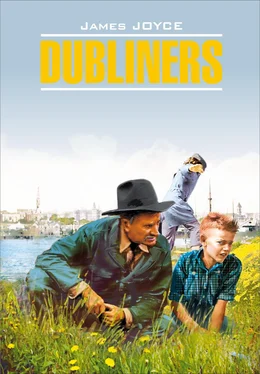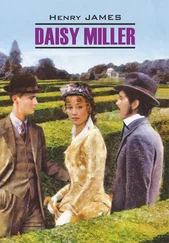Джеймс Джойс - Dubliners / Дублинцы. Книга для чтения на английском языке
Здесь есть возможность читать онлайн «Джеймс Джойс - Dubliners / Дублинцы. Книга для чтения на английском языке» — ознакомительный отрывок электронной книги совершенно бесплатно, а после прочтения отрывка купить полную версию. В некоторых случаях можно слушать аудио, скачать через торрент в формате fb2 и присутствует краткое содержание. ISBN: , Жанр: foreign_language, literature_20, foreign_prose, на английском языке. Описание произведения, (предисловие) а так же отзывы посетителей доступны на портале библиотеки ЛибКат.
- Название:Dubliners / Дублинцы. Книга для чтения на английском языке
- Автор:
- Жанр:
- Год:неизвестен
- ISBN:978-5-9925-0839-0
- Рейтинг книги:5 / 5. Голосов: 1
-
Избранное:Добавить в избранное
- Отзывы:
-
Ваша оценка:
- 100
- 1
- 2
- 3
- 4
- 5
Dubliners / Дублинцы. Книга для чтения на английском языке: краткое содержание, описание и аннотация
Предлагаем к чтению аннотацию, описание, краткое содержание или предисловие (зависит от того, что написал сам автор книги «Dubliners / Дублинцы. Книга для чтения на английском языке»). Если вы не нашли необходимую информацию о книге — напишите в комментариях, мы постараемся отыскать её.
Книга адресована студентам языковых вузов и всем любителям современной англоязычной литературы.
Dubliners / Дублинцы. Книга для чтения на английском языке — читать онлайн ознакомительный отрывок
Ниже представлен текст книги, разбитый по страницам. Система сохранения места последней прочитанной страницы, позволяет с удобством читать онлайн бесплатно книгу «Dubliners / Дублинцы. Книга для чтения на английском языке», без необходимости каждый раз заново искать на чём Вы остановились. Поставьте закладку, и сможете в любой момент перейти на страницу, на которой закончили чтение.
Интервал:
Закладка:
It was too late and we were too tired to carry out our project of visiting the Pigeon House. We had to be home before four o’clock lest our adventure should be discovered. Mahony looked regretfully at his catapult and I had to suggest going home by train before he regained any cheerfulness. The sun went in behind some clouds and left us to our jaded thoughts and the crumbs of our provisions.
There was nobody but ourselves in the field. When we had lain on the bank for some time without speaking I saw a man approaching from the far end of the field. I watched him lazily as I chewed one of those green stems on which girls tell fortunes. He came along by the bank slowly. He walked with one hand upon his hip and in the other hand he held a stick with which he tapped the turf lightly. He was shabbily dressed in a suit of greenish-black and wore what we used to call a jerry hat with a high crown. He seemed to be fairly old for his moustache was ashen-grey. When he passed at our feet he glanced up at us quickly and then continued his way. We followed him with our eyes and saw that when he had gone on for perhaps fifty paces he turned about and began to retrace his steps. He walked towards us very slowly, always tapping the ground with his stick, so slowly that I thought he was looking for something in the grass.
He stopped when he came level with us [26] came level with us – ( разг. ) поравнялся с нами
and bade us good-day. We answered him and he sat down beside us on the slope slowly and with great care. He began to talk of the weather, saying that it would be a very hot summer and adding that the seasons had changed greatly since he was a boy – a long time ago. He said that the happiest time of one’s life was undoubtedly one’s school-boy days and that he would give anything to be young again. While he expressed these sentiments which bored us a little we kept silent. Then he began to talk of school and of books. He asked us whether we had read the poetry of Thomas Moore [27] Thomas Moore – Томас Мор (1478–1535), английский гуманист, государственный деятель, писатель, один из основоположников утопического социализма романтического романа
or the works of Sir Walter Scott [28] Sir Walter Scott – сэр Вальтер Скотт (1771–1832), английский писатель, основоположник английского
and Lord Lytton [29] Lord Lytton – Лорд Литтон (1803–1873), английский романист, драматург, политический деятель
. I pretended that I had read every book he mentioned so that in the end he said:
“Ah, I can see you are a bookworm like myself. Now,” he added, pointing to Mahony who was regarding us with open eyes, “he is different; he goes in for games.”
He said he had all Sir Walter Scott’s works and all Lord Lytton’s works at home and never tired of reading them. “Of course,” he said, “there were some of Lord Lytton’s works which boys couldn’t read.” Mahony asked why couldn’t boys read them – a question which agitated and pained me because I was afraid the man would think I was as stupid as Mahony. The man, however, only smiled. I saw that he had great gaps in his mouth between his yellow teeth. Then he asked us which of us had the most sweethearts. Mahony mentioned lightly that he had three totties. The man asked me how many had I. I answered that I had none. He did not believe me and said he was sure I must have one. I was silent.
“Tell us,” said Mahony pertly to the man, “how many have you yourself?”
The man smiled as before and said that when he was our age he had lots of sweethearts.
“Every boy,” he said, “has a little sweetheart.”
His attitude on this point struck me as strangely liberal in a man of his age. In my heart I thought that what he said about boys and sweethearts was reasonable. But I disliked the words in his mouth and I wondered why he shivered once or twice as if he feared something or felt a sudden chill. As he proceeded I noticed that his accent was good. He began to speak to us about girls, saying what nice soft hair they had and how soft their hands were and how all girls were not so good as they seemed to be if one only knew. There was nothing he liked, he said, so much as looking at a nice young girl, at her nice white hands and her beautiful soft hair. He gave me the impression that he was repeating something which he had learned by heart or that, magnetised by some words of his own speech, his mind was slowly circling round and round in the same orbit. At times he spoke as if he were simply alluding to some fact that everybody knew, and at times he lowered his voice and spoke mysteriously as if he were telling us something secret which he did not wish others to overhear. He repeated his phrases over and over again, varying them and surrounding them with his monotonous voice. I continued to gaze towards the foot of the slope, listening to him.
After a long while his monologue paused. He stood up slowly, saying that he had to leave us for a minute or so, a few minutes, and, without changing the direction of my gaze, I saw him walking slowly away from us towards the near end of the field. We remained silent when he had gone. After a silence of a few minutes I heard Mahony exclaim:
“I say! Look what he’s doing!”
As I neither answered nor raised my eyes Mahony exclaimed again:
“I say [30] I say – ( разг. ) Ничего себе
… He’s a queer old josser!”
“In case he asks us for our names,” I said, “let you be Murphy and I’ll be Smith.”
We said nothing further to each other. I was still considering whether I would go away or not when the man came back and sat down beside us again. Hardly had he sat down when Mahony, catching sight of the cat which had escaped him, sprang up and pursued her across the field. The man and I watched the chase. The cat escaped once more and Mahony began to throw stones at the wall she had escaladed. Desisting from this, he began to wander about the far end of the field, aimlessly.
After an interval the man spoke to me. He said that my friend was a very rough boy and asked did he get whipped often at school. I was going to reply indignantly that we were not National School boys to be whipped, as he called it; but I remained silent. He began to speak on the subject of chastising boys. His mind, as if magnet-ised again by his speech, seemed to circle slowly round and round its new centre. He said that when boys were that kind they ought to be whipped and well whipped. When a boy was rough and unruly there was nothing would do him any good but a good sound whipping [31] a good sound whipping – ( разг. ) хорошая взбучка
. A slap on the hand or a box on the ear was no good: what he wanted was to get a nice warm whipping. I was surprised at this sentiment and involuntarily glanced up at his face. As I did so I met the gaze of a pair of bottle-green eyes peering at me from under a twitching forehead. I turned my eyes away again.
The man continued his monologue. He seemed to have forgotten his recent liberalism. He said that if ever he found a boy talking to girls or having a girl for a sweetheart he would whip him and whip him; and that would teach him not to be talking to girls. And if a boy had a girl for a sweetheart and told lies about it then he would give him such a whipping as no boy ever got in this world. He said that there was nothing in this world he would like so well as that. He described to me how he would whip such a boy as if he were unfolding some elaborate mystery [32] as if he were unfolding some elaborate mystery – ( разг. ) как будто раскрывал страшную тайну
. He would love that, he said, better than anything in this world; and his voice, as he led me monotonously through the mystery, grew almost affectionate and seemed to plead with me that I should understand him.
Интервал:
Закладка:
Похожие книги на «Dubliners / Дублинцы. Книга для чтения на английском языке»
Представляем Вашему вниманию похожие книги на «Dubliners / Дублинцы. Книга для чтения на английском языке» списком для выбора. Мы отобрали схожую по названию и смыслу литературу в надежде предоставить читателям больше вариантов отыскать новые, интересные, ещё непрочитанные произведения.
Обсуждение, отзывы о книге «Dubliners / Дублинцы. Книга для чтения на английском языке» и просто собственные мнения читателей. Оставьте ваши комментарии, напишите, что Вы думаете о произведении, его смысле или главных героях. Укажите что конкретно понравилось, а что нет, и почему Вы так считаете.












